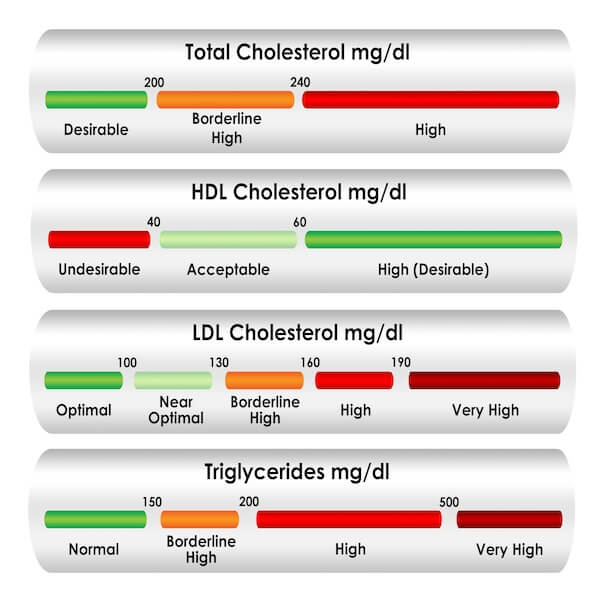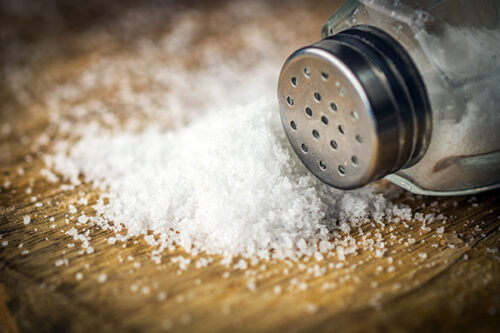High Cholesterol

Cause: The American diet is the real culprit. A cholesterol level of 210 mg is the average for people living in industrialized countries; this level predicts a 50% chance of premature death from strokes or heart attacks due to atherosclerosis. A rise in cholesterol level from 200mg/dl to 260 mg/dl increases the risk of death by 500%. People with levels below 180 mg/dl during their lifetime rarely have heart disease; and finally, in the famous Frammingham, Massachusetts study on the relationship between heart disease and cholesterol levels, no one has died of heart disease whose cholesterol level was kept below 150 mg/dl. Each 1% decrease in cholesterol is represented by a 2% to 3% decrease in the risk of dying from heart disease. Based on all I know, I would set a goal for you of less than 150 mg/dl.
Some studies show that caffeine will increase the cholesterol level by an average of 10%. More sensitive individuals will show even greater rises in response to caffeine.
I treat my patients in steps–adding one kind of therapy after another, providing each is well tolerated. My goal is to get levels down below 150 mg/dl safely, and as soon as possible.
For a complete discussion of cholesterol and heart disease see The McDougall Program for a Healthy Heart (Dutton 1996).
Related Videos
+-Recommendations
+-Steps For Lowering Levels of Blood Cholesterol
- A no-cholesterol, low-fat starch-based diet. A low-fat, no-cholesterol diet changes the dominant flow of cholesterol and fat from into the artery wall, to out of the artery. This change quickly reduces pressure inside the plaque; reducing the risk of rupture, and the clotting off of the blood vessel that too often follows.In addition to the profound cholesterol lowering effects of a low-fat, no-cholesterol diet there are many other benefits of a healthy diet that reduce the risks of heart attacks and strokes almost overnight.Animal (saturated) fats are the strongest promoters of blood clotting that we contact daily. The day you stop eating animal fats is the day your blood “thins” out; and in the event one of your plaques does rupture the blood is less likely to clot (the blood vessel remains open.) The reason aspirin and fish oil reduce heart attacks is because they also lessen the tendency for blood to clot (they “thin” the blood). Animal fats increase the production of prostaglandin hormones that cause the blood vessels to constrict which may slow the flow of blood and increase the chance of the blood clotting. One last factor is the sludging of blood cells that follows meals high in any kind of fat. Fat from the food enters the blood stream and coats the blood cells causing them to stick together. The clumped blood moves slowly and clots easily. Thus because of the multiple benefits of healthy food, diet is the foundation of any therapy intended to keep you alive and functioning fully. Scientific studies were revealing an ideal cholesterol–a level where heart disease is not found. This same level became a goal for pioneer researchers demonstrating reversal of atherosclerosis. Ideal cholesterol is 150 mg/dl.
- Cholesterol Lowering Drugs: I have been prescribing cholesterol lowering medications for those people who are not able to reach the ideal of 150 mg/dl or less by diet alone. If the person has a history of artery disease (past heart attack, bypass surgery, angioplasty, TIA, stroke, etc.) then I am even more devoted to lowering their cholesterol quickly in an effort to reduce the risk of a tragedy. The decision boils down to this question: Does the risk of death and disability due to artery disease exceed the side effects, costs and inconvenience of taking cholesterol-lowering medication? There is no clear cut answer–incomplete studies and research information, judgment and guess work lead to a course of action.
Recommended Articles

Salt: The Scapegoat for the Western Diet

Is Falling Asleep After Eating a Sign of Diabetes?






